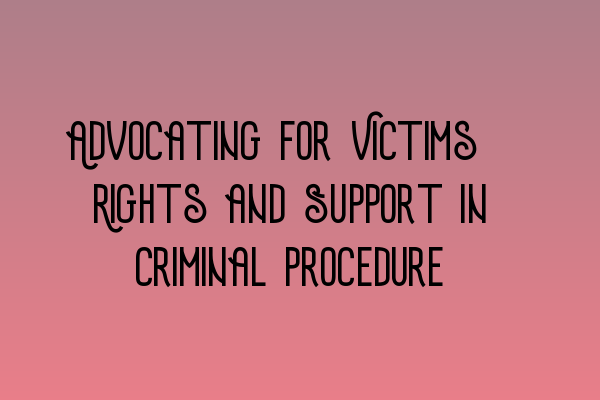Advocating for Victims: Rights and Support in Criminal Procedure
The criminal justice system is built on the principle of providing justice to all individuals involved. While much attention is often given to the rights and protections afforded to the accused, it is equally important to advocate for the rights and support of victims throughout the criminal procedure.
Victims of crime can often face significant emotional, financial, and physical challenges as a result of their experience. It is essential that they are afforded the necessary support and resources to help them navigate the criminal justice process. This includes ensuring their rights are upheld, their voices are heard, and they receive the assistance they need to rebuild their lives.
Victims’ Rights in Criminal Procedure
Victims have certain rights within the criminal justice system to ensure their interests are protected. These rights include:
- The right to be treated with fairness, respect, and dignity throughout the process.
- The right to be informed about the progress of the case, including updates on court proceedings and decisions.
- The right to be present and heard at critical stages of the criminal procedure, such as bail hearings and sentencing.
- The right to request protection measures, such as restraining orders, to ensure their safety.
- The right to provide input and impact statements to the court during sentencing.
- The right to apply for compensation for any losses or injuries suffered as a result of the crime.
It is the role of the criminal law solicitor to ensure that these rights are upheld and that victims are aware of their entitlements. By providing clear and comprehensive information, solicitors can empower victims to actively participate in the criminal procedure and make informed decisions about their case.
Support for Victims
Support is crucial for victims of crime to aid their recovery and assist them through the criminal justice system. There are various support services available to victims, including:
- Counseling and therapy services to address the emotional trauma caused by the crime.
- Victim advocates who provide guidance, support, and information throughout the criminal procedure.
- Referrals to support organizations that specialize in assisting victims of specific crimes, such as domestic violence or sexual assault.
- Access to financial assistance programs for medical expenses, property damage, or other related costs.
It is important for criminal law solicitors to work closely with these support services to ensure all necessary resources are made available to victims. By collaborating with victim support organizations, solicitors can provide a comprehensive and holistic approach to assisting victims throughout their legal journey.
Advocating for Change
While progress has been made in recognizing and protecting the rights of victims, there is always room for improvement. Criminal law solicitors can play a crucial role in advocating for change in criminal procedure to better support victims. This can be achieved by:
- Engaging in policy discussions and providing input on legislation that impacts victims’ rights.
- Collaborating with victim advocacy groups to identify areas where improvements can be made.
- Raising awareness about the challenges faced by victims and the importance of their inclusion in the criminal justice system.
- Continuing education and professional development to stay informed about evolving practices and policies regarding victims’ rights.
By actively advocating for change, criminal law solicitors can help create a justice system that not only safeguards the rights of the accused but also supports and empowers victims of crime.
For more information on preparing for the SQE exams, check out these related articles:
